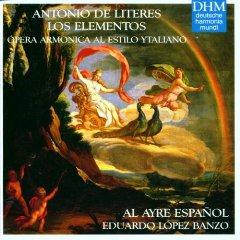Literes - Los Elementos (1998)
Literes - Los Elementos (1998)

1 Frondosa, Apacible Estancia / Moradores De Estas Playas 2 Y Así Le Festejen 3 Pues Reverentes Aves Le Gorjean 4 Recitado: Y Al Rápido Sonido De Mi Aliento / Arieta: Olmo Apacible 5 Recitado: Mas Si Fuese La Planta Fugitiva 6 Y Pues Soy El Agua 7 El Ayre Soy / Arieta: Surque Halagüeña 8 Recitado: No Podrá / Arieta: De Flores Vestida 9 Y En Tan Triste Confución 10 Arieta: Ay Amor 11 Sienta La Terra 12 Recitado: Mas En La Oscura Noche / Arieta: Sedienta De Infujos 13 Iras Fatales Fulminan 14 Recitado: Y Aunque Intende La Fatiga / Arieta: Risueña El Aurora 15 Recitado: Y Pues La Luz 16 Y Sus Acordes Fragancias 17 Recitado: Y Pues Ya Se Desvían / Arieta: En Brazos Del Alba 18 Recitado: Deidades, Que En El Monte / Arieta: Suenen Los Clarines 19 Dormida Fatiga 20 El Moble Diamante 21 Y Pues Tierra 22 Flores; Aves; Fuentes; Rios 23 Esfera Copiosa Marta Almajano (El Ayre, La Aurora) Lola Casariego (La Tierra) Anne Grimm (El Agua) Xenia Meijer (El Fuego) Jordi Ricard (El Tiempo) Carlos Mena (countertenor) Al Ayre Español Eduardo López Banzo - conductor
This latest offering from Al Ayre Espanol is as fascinating as their three previous discs (Deutsche Harmonia Mundi, 8/95, 1/96 and 7/97) for the insight it affords into the little-explored territory of the Spanish baroque. Unlike their earlier ‘anthology’ recordings, however, this CD is dedicated to a single, larger-scale piece: Los elementos by the court composer Antonio de Literes. Subtitled “opera armonica al estilo ytaliano”, the work is not really an opera, more perhaps an extended prologue, or loa, that possibly originally introduced another theatrical entertainment, whether an opera proper or a play with or without music.
So little is known about the origins of Los elementos (rather less, in fact, than is suggested by the somewhat misleading booklet-notes), that it is difficult to categorize or contextualize at present. What is absolutely clear is the influence of the Italian style that pervaded the Spanish court towards the end of the seventeenth century and was given further impetus with the accession of the first Bourbon king in 1700. The succession of recitatives and arias in Los elementos is occasionally disrupted by the introduction of the indigenous verse-and-refrain form of estribillo and coplas; even here the musical style is wholeheartedly Italian, which makes the use of castanets (for the most part in the tutti sections) seem totally anachronistic. Apart from this quibble, however, the performance is generally excellent with a strong line-up of Spanish singers, of whom Marta Almajano will be the most familiar to those who have enjoyed Al Ayre Espanol’s other recordings.
The roles of the four elements are taken by four female voices, while the figure of Tiempo (Time) is here sung by the Catalan baritone Jordi Ricart. Literes gives his soloists plenty of opportunity to shine, seemingly quite at home with the virtuoso aria as well as with the lyrical style of recitative characteristic of music for the Spanish theatre. In the first part of the piece the properties of the four elements – air, earth, fire and water – are described, giving the composer plenty of scope for contrast, while the portrayal of the gradual arrival of dawn – and the ways in which each of the elements is affected – is equally vividly drawn.
Literes proves himself to be a composer of imagination and secure technique; possibly in a future interpretation a greater sense of the whole might be achieved as there is a slight start-stop feel to Eduardo Lopez Banzo’s pacing, although the choice of tempos is on the whole convincing. The playing is fine (the continuo occasionally over-exuberant), and the overall sound is very good. I would strongly recommend this CD to anyone with an interest in baroque music (and not just Spanish music) for the quality of the work and the contribution this recording makes to a richer and fuller picture of the musical past. --- Tess Knighton, gramophone.co.uk
download (mp3 @320 kbs):
yandex mediafire uloz.to mega 4shared cloudmailru gett








